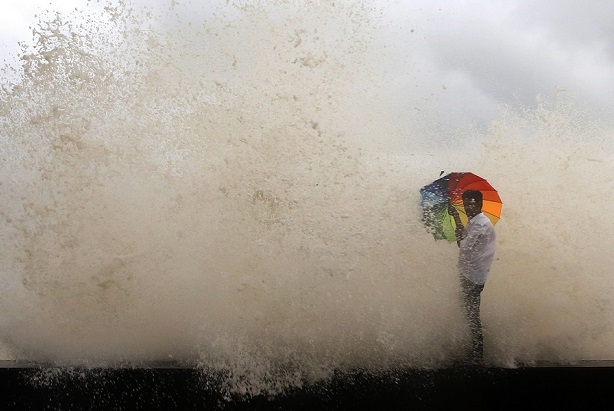 This third financial risk is "massive," says the report, "considering that 40 percent of the world's population, or 2.4 billion people, lives within 60 miles of the coast." (Photo: AP)
This third financial risk is "massive," says the report, "considering that 40 percent of the world's population, or 2.4 billion people, lives within 60 miles of the coast." (Photo: AP)
Both globally and at home, retirement security is under threat from three factors that can utterly disrupt workers' long-term plans.
That's according to the Natixis Global Retirement Index, which points the finger at interest rates, demographics and climate change.
1. Interest rates
With interest rates low and sinking lower, borrowers may be happy but retirees and plan sponsors aren't. Not only have rates been low since the Great Recession, which has weighed on yields from retirement plans and other retirement investments, they're now on their way down again as the threat of another recession looms—and that drives up pension liabilities.
Says the report, "Ten years after the crisis, every 25-bps cut off rates means a $25 cut from income earned off $10,000, $250 off $100,000, and $2,500 off $1 million."
That means that would-be retirees really can't abide by outdated long-term advice about withdrawal and yield rates if they want to make it to the end of their lives without running out of money.
In addition, as bond investors seek to reinvest funds once their long-term bonds mature, they're finding they can't do so at anything like the yields they once relied on.
So as they age and their expenses likely rise from health care costs, if not just from overall inflation, they're not getting as much as they did when their expenses might actually have been lower—compelling them to live on less or find an alternate source of retirement income.
And some will turn to riskier forms of investment in search of higher yields, which doesn't bode well for the long term—and perhaps not even for the short term.
2. Demographics
Demographics turn low interest rates into a double whammy by extending lifespans so that people need more money, not less, to get by till the ends of their lives.
Not only does this pressure the individual investor, but it also weighs on countries' retirement systems, particularly as the boomer generation ages and is not "replaced" by an equal number of young workers entering the workplace.
The old age dependency ratio, which looks at the number of people age 65 and above for every 100 workers (age 15–64), has risen globally from 8.6 in 1960 to 12.6 in 2015.
But, says the report, more developed countries have more older people; it cites the United Nations reporting that "the impact of aging populations is most pronounced in more developed countries, where the ratio is now close to 30.0."
That means the number of people taking money out of retirement systems is growing by leaps and bounds compared to the number of people putting money into retirement systems.
And the longer they live, the longer they'll be doing so. Says the report, "OECD projects that pension spending will grow from 8.9 percent of GDP in 2013–2015 to as much as 9.5 percent in 2050. That's a $4.6 trillion total increase in public spending on pensions. By way of comparison, the U.S. GDP has grown by an average of only 2 percent annually since 2000."
3. Climate change
Last but far from least is climate change. From the report: "The financial risk is massive considering that 40 percent of the world's population, or 2.4 billion people, lives within 60 miles of the coast. Ten percent lives in coastal areas that are less than 10 meters above sea level. Considering that many retirees are living on a fixed income, sharp climate-driven insurance rate hikes could upend financial plans. In many instances, a primary home may be the single largest personal asset owned by individuals. Without insurance, retirees could be financially wiped out by extreme weather damage."
Not only are they at risk of displacement (and of course many retirees flock to the coasts in the U.S.), but higher temperatures put a greater strain on elders' health, particularly among those with chronic illnesses.
So climate change can rob retirees not only of their homes but also of their health and possibly their lives, as death tolls rise from storms and increased illnesses.
Absent some drastic action, retirement may not be the golden-age dream that so many have looked forward to.
READ MORE:
© 2025 ALM Global, LLC, All Rights Reserved. Request academic re-use from www.copyright.com. All other uses, submit a request to [email protected]. For more information visit Asset & Logo Licensing.







